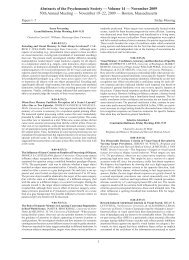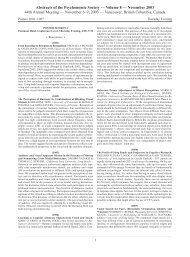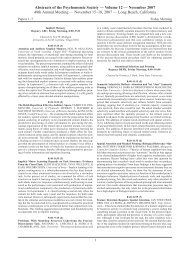Abstracts 2005 - The Psychonomic Society
Abstracts 2005 - The Psychonomic Society
Abstracts 2005 - The Psychonomic Society
You also want an ePaper? Increase the reach of your titles
YUMPU automatically turns print PDFs into web optimized ePapers that Google loves.
Posters 2028–2034 Friday Noon<br />
(2028)<br />
<strong>The</strong> Importance of Preexisting Long-Term Memory Representations<br />
in Directed Forgetting. KIRSTEN BURGHARDT & FABRICE<br />
B. PARMENTIER, University of Plymouth—In a directed forgetting task<br />
using verbal stimuli, Oberauer (2001) showed that participants are<br />
slower to reject to-be-forgotten items than new probes. This “intrusion<br />
cost” was attributed to a slowly decaying residual activation of longterm<br />
memory traces corresponding to the to-be-forgotten stimuli. <strong>The</strong><br />
present study tested this assumption by using spatial stimuli for which<br />
participants had no existing memory representations and the same<br />
spatial stimuli when participants had developed transient representations<br />
of these items. <strong>The</strong> results showed that the intrusion cost was<br />
mediated by the existence of stable memory representations for the<br />
stimuli: Participants unfamiliar with the stimuli showed no distinction<br />
between to-be-forgotten and new probes, whereas participants trained<br />
to learn the set of locations showed the intrusion cost. This finding is<br />
discussed with regard to current models of memory.<br />
• FEEDBACK AND MEMORY •<br />
(2029)<br />
<strong>The</strong> Testing Effect: Enhanced Retention or Attenuated Forgetting?<br />
SHANA K. CARPENTER, HAROLD PASHLER, & JOHN T. WIXTED,<br />
University of California, San Diego—<strong>The</strong> present study investigated<br />
the effect of an intervening memory test versus a restudy opportunity<br />
on the rate of forgetting of obscure facts. After encoding 60 facts, participants<br />
completed a cued-recall test with feedback over half of the<br />
facts and received an additional study presentation over the other half.<br />
A final cued-recall test over all of the facts was given after 5 min,<br />
1 day, 2 days, 7 days, 14 days, or 42 days. At each of the six intervals,<br />
the proportion of items retained from test versus restudy conditions<br />
was calculated, and power functions were fit to the data to describe<br />
the rates of forgetting following test versus restudy trials. Results help<br />
to answer the question of whether the typical advantage in retention<br />
for tested over restudied items is due to enhanced retention or attenuated<br />
forgetting for tested items relative to restudied items.<br />
(2030)<br />
Successfully Applying the Testing Effect in a College Classroom.<br />
KAREN S. CLIFTON, DAVID L. TRUMPOWER, & STEVEN P.<br />
MEWALDT, Marshall University—Repeated testing has been found<br />
to improve recall of a list of words and of simulated classroom material<br />
in laboratory settings. <strong>The</strong> present study evaluated the effect of<br />
prior testing on subsequent performance on unit exams in eight introductory<br />
psychology classes across 12 weeks of class. Approximately<br />
halfway through a 4-week unit and near the end of a unit, students<br />
took an online quiz consisting of fill in the blank type multiple<br />
choice questions that were easy or relatively difficult; in a control condition,<br />
subjects read statements with the blanks filled in, or they received<br />
no practice. Both easy and hard quiz items significantly improved<br />
performance on the unit exams, when compared with the<br />
control items.<br />
(2031)<br />
Can Controlled Processes Improve Performance in the Misinformation<br />
Paradigm? JOHN B. BULEVICH, Washington University (sponsored<br />
by Mitchell Sommers)—Misleading postevent information<br />
often produces erroneous recollection of memory for an original event<br />
(Loftus, Miller, & Burns, 1978). Furthermore, susceptibility to misinformation<br />
is modulated by age of the participant, with older adults<br />
demonstrating poorer memory for the original event after misinformation<br />
than younger adults (Mitchell, Johnson, & Mather, 2002). <strong>The</strong><br />
present study examined whether subjective experience and cognitive<br />
control could reduce age differences in misinformation susceptibility.<br />
In three experiments, participants viewed an original event and received<br />
misinformation. Utilizing a multiple test procedure (Koriat &<br />
Goldsmith, 1996), participants received a forced report test with con-<br />
74<br />
fidence ratings followed by a free report test where they were allowed<br />
to pass. Retrieval demands and performance incentives were manipulated<br />
across experiments. <strong>The</strong> results demonstrate that both older and<br />
younger adults can improve their performance when allowed to pass<br />
and that older adult’s deficits are largely driven by miscalibration of<br />
their subjective experience.<br />
(2032)<br />
Suspicious Minds Reduce the Postidentification Feedback Effect.<br />
JEFFREY S. NEUSCHATZ, University of Alabama, Huntsville,<br />
MICHAEL P. TOGLIA, SUNY, Cortland, CHARLES A. GOODSELL,<br />
DEAH S. LAWSON, & JESSICA K. SWANNER, University of Alabama,<br />
Huntsville, & JOSEPH S. NEUSCHATZ, Roger Williams University—We<br />
examined techniques designed to diminish the postidentification<br />
feedback effect. Participants viewed a video event and then<br />
were asked to identify a suspect from a target-absent photo lineup.<br />
Following their identification, some participants were told that their<br />
selection was correct, whereas others were not given feedback concerning<br />
the accuracy of their identification. Some participants who received<br />
confirming feedback were also given reasons to entertain suspicion<br />
regarding the motives of the lineup administrator, either<br />
immediately (Experiment 1) or after a 1-week retention interval (Experiment<br />
2). Suspicious subjects did not demonstrate confidence inflation<br />
effects typically associated with confirming postidentification<br />
feedback. In Experiment 3, the confidence prophylactic effect was<br />
tested both immediately and after a 1-week delay. <strong>The</strong> impact of the<br />
confidence prophylactic procedure varied with retention interval.<br />
That is, it eliminated the effects of postidentification feedback immediately,<br />
but not after the retention interval. Both theoretical and<br />
practical implications of the results are discussed.<br />
(2033)<br />
Retaining Versus Replacing Incorrect Choices in Multichoice Items:<br />
Implications for Learning. DOMINIC A. SIMON, New Mexico State<br />
University—A feature of multiple-choice test items is that the incorrect<br />
responses may become associated with the question and later may<br />
be wrongly thought to be the correct answer, particularly when endorsed<br />
for items for which the correct answer was not known a priori.<br />
This possibility was explored in an experiment in which participants<br />
(n = 77) saw 60 multiple-choice general information items. <strong>The</strong> questions<br />
were presented in random order over four rounds. If correctly answered<br />
twice, an item was dropped from the pool. Items that were apparently<br />
not known a priori were treated in two ways across subsequent<br />
rounds: <strong>The</strong> original alternatives were retained, or the wrongly endorsed<br />
choice was replaced. Contrary to prediction, replacement/<br />
retention of incorrect alternatives did not affect the probability of correct<br />
responding on a test of all the original items following a filled<br />
delay ( p = .093). Number of presentations was related to test performance<br />
( p < .001).<br />
(2034)<br />
Feedback Benefits Correct Responses Made With Low Confidence.<br />
ANDREW C. BUTLER & HENRY L. ROEDIGER III, Washington<br />
University (sponsored by Jason M. Watson)—<strong>The</strong> level of confidence<br />
in a response has a substantial effect on the perception and use of feedback.<br />
For example, high-confidence incorrect responses lead to longer<br />
feedback study times and tend to be “hyper-corrected” on subsequent<br />
tests. Although most contemporary investigations of verbal learning<br />
focus on the role of feedback as a mechanism for error correction, the<br />
present research sought to demonstrate the importance of feedback on<br />
the retention of correct responses, especially those made with low confidence.<br />
Participants took an initial four-alternative multiple-choice<br />
test on general knowledge facts, indicating their level of confidence<br />
after each response. Feedback was given for half of the responses.<br />
Learning was assessed on a delayed (5 min) cued recall test. <strong>The</strong> results<br />
indicate that feedback provides substantial benefit to the retention<br />
of correct responses, especially those made with low confidence.





